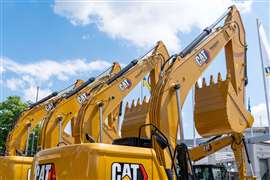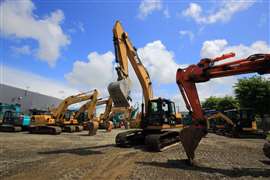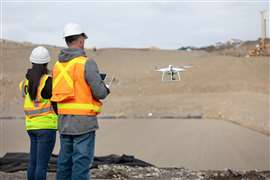Feature - Towards recovery
17 June 2015

Brazilian equipment rental association ALEC held its annual exhibition, Feloc Rental, last month in the city of Atibaia, about an hour from the financial centre of São Paulo. International Rental News was represented by sister magazine Construction Latin America’s correspondent in the country.
Alongside Feloc Rental, the association has started a new conference format known as Alugar Brasil, an educational programme to be repeated in other parts of the country, which aims to become a source of information for the sector. ALEC is determined to improve standards in the Brazilian rental market and make it more professional in its approach.
This seems to be especially relevant now, given the poor market rental companies face today. Fernando Forjaz, the president of ALEC, said: “We want to professionalise Brazilian rental. To accomplish this, we develop training sessions to which many manufacturers are contributing.
“If rental companies can provide excellent maintenance, machines will work better and for longer. Only then we can convince contractors that a rented machine enhances their productivity”.
While the conferences in Alugar Brasil discussed means to improve practices in Brazilian rental industry, in the next hall manufacturers exhibited their equipment with a poor outlook for 2015. Some of them were reporting, though unofficially, drops of up to 70% in sales this year compared to 2014.
However, Mr Forjaz’s determination is unchanged. “Our job is not to prepare rental companies for a market downturn. We want to help them perform well whatever the size of the market.”
Effect on prices
Despite a sharp fall in demand, the Brazilian rental market is with patience and resilience. For example, no major player in the sector is talking about lowering prices excessively or selling off its fleet.
Instead, many feel that the best choice will be to leave part of the fleet idle and let the market find a balance in its own time. This would allow companies to remain profitable during the crisis, because maintenance involves importing original parts.
Jim Roest, a Dutchman living in Brazil for the past seven years and head of the national branch of Riwal, attended the conference.
His definition of how to sort out the current crisis is an interesting one: “If the client doesn’t need the equipment, even a 90% discount won’t work. However, maybe sectors other than construction are in need of what we have. So the easiest way is not always the best way.”
Mr Roest defends a new vision for Brazilian market, which is in keeping with ALEC’s wish for more professionalism.
“Rental is a service. Not everyone in Brazil understands this. Lower prices are one thing, but it cannot come to the point where clients decide everything. If we don’t keep our price structure, business would be destroyed. My personal challenge is to support this industry in finding new markets, like Christmas decorations or fruit harvest seasons.
“It must not be restricted to construction, we need to diversify and distribute market risks.”
His words are a sign of a rising maturity in the Brazilian rental market. Other signs could be found during Alugar Brasil, the educational programme.
The national branch of Hilti presented research into rental companies’ clients last year. Its findings are not the most pleasing for the sector, but at least show there is an awareness of the weaknesses.
According to Hilti Brazil, 75% of interviewed clients say they see no differences between rental companies. In addition, 79% of clients said they disregarded care for a rented machine because they found the equipment old or outdated. An even larger figure, 87% said they don’t consider rental companies as a source of information, technologies or solutions for their businesses.
Direct investment
Rental company Degraus is hot news in the Brazilian market just now. The reason is very clear: the direct investment it received from French giant Loxam, which has recently acquired 25% of its capital.
For Brazilian current rental standards, this is huge business, and is talked about as such - mainly because this is the first time a foreign rental company has invested directly into a Brazilian one.
Izaac Costa, president of Degraus, said: “Other Brazilian renters have received foreign investment before, but only from private equity investors.
“We chose to partner with someone from inside the industry.”
Mr Costa said that Loxam could have made a larger investment in his company, but in the event the 25% stake was a wise decision given current market conditions.
According to Mr Costa, the investment should not change Degraus’ business plan in the short term. His idea is to add Loxam’s capital into the already wide business lines managed by his company.
“Today, we are among the top five general equipment rental companies in Brazil. We rent around 300 items, from electrical tools to aerial work platforms and power generators. At first, Loxam will help us to strengthen our business units. But in two years time we believe market will improve and then we can even things up,” he said.
In a market characterised by specific equipment renters, Degraus offers a diversified portfolio as a differentiating factor. Today, the company is present in the seven most industrialised Brazilian states. A high percentage of its business, however, is concentrated in the state of São Paulo.
Possibly, the new investment will open doors in regions where Degraus still doesn’t have a presence, like the southern Paraná and Santa Catarina, two rich states where both industry and agriculture are powerful sectors. It could help the company get into the Amazon, where the need for heavy infrastructure investment poses a clear opportunity for any equipment provider.
Eventually, this would mean widening Degraus’ machine portfolio, though Mr Costa does not have heavy purchase plans for the short term.
“We will listen to Loxam a lot, because they are leaders in non-specific European rental. They have this ‘generalist’ feeling. They will add much in terms of knowledge and techniques.”
Future perspectives
Whether the Brazilian construction market as a whole, and more specifically the rental market, are heading towards recovery, is unforeseeable for the time being.
The most optimistic predictions see 2016 as the turning point, as practically everyone agrees that this year is lost in an unavoidable recession with negative growth of at least 1%.
If the recovery does come next year, it will be the outcome of a tremendous political effort in the name of a rather modest fiscal effort. Brazil promises to save about 1% of its gross domestic product as a means to check balances.
But what should be a matter of reason and patient execution is actually a cause of sheer conflict. As a result, any economic sector in the country is taking things for granted.
Construction is pressing for new public investment, which would certainly reactivate the industry but is unlikely to take place as it could end up harming plans to tighten public spending.
The chances are that a scenario of high inflation combined with recession may bring about consistent concessions. Many see this as the only hope for the near future.
This is a feature from the June issue of IRN, which is published next week. For the full feature, including extra images and box stories, or to see other features from the issue, please subscribe to the magazine: http://www.khl.com/subscriptions






